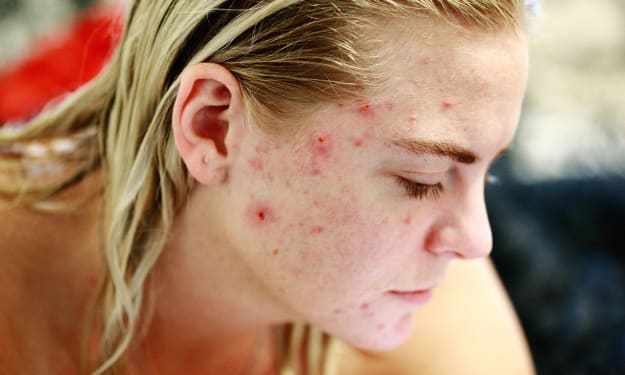Best Skin Solutions
the natural way

The Impact of Skin Problems
Skin problems plague a large percentage of the population, and their effects can be both physically and emotionally frustrating. Many individuals experience various skin conditions that can range from mild irritations to chronic and debilitating ailments. The impact of these skin issues often goes beyond the surface, affecting one’s self-esteem, social interactions, and overall quality of life.
Skin Problems: A Common Challenge
From acne and eczema to psoriasis and dermatitis, skin problems come in different forms and affect people of all ages and backgrounds. These conditions can be caused by a variety of factors, including genetics, hormonal imbalances, environmental triggers, and lifestyle choices. The prevalence of skin problems underscores the importance of understanding their impact and seeking appropriate solutions.
Seeking Solutions: The Role of Dermatologists
When faced with persistent or severe skin issues, many individuals turn to dermatologists for expert guidance and treatment. Dermatologists are medical professionals specializing in the diagnosis, management, and prevention of skin conditions. They play a crucial role in helping patients navigate their skin problems and develop customized treatment plans.
Dermatologists may recommend various interventions, such as topical creams, oral medications, light therapy, or surgical procedures, depending on the nature and severity of the condition. These treatments aim to alleviate symptoms, reduce inflammation, and promote healing of the skin. While dermatological interventions can be effective in managing skin problems, they often focus on addressing symptoms rather than addressing the root cause of the issue.
The Medical Approach to Skin Problems
The conventional medical approach to skin problems typically involves a combination of symptomatic relief and long-term management. Dermatologists often prescribe topical corticosteroids, antihistamines, or antibiotics to control inflammation, itching, and infection. While these medications can provide temporary relief, they may not offer a lasting solution to the underlying problem.
Furthermore, some skin conditions, such as eczema and psoriasis, are chronic in nature and require ongoing management to prevent flare-ups and alleviate discomfort. Patients with these conditions may need to follow strict skincare regimens, avoid certain triggers, and undergo periodic consultations with their dermatologist to monitor their progress.
Challenges in Finding Solutions
Despite advances in dermatological research and treatment options, finding permanent solutions to skin problems remains a challenge for many individuals. The complex nature of skin conditions, the variability of triggers and symptoms, and the lack of universal treatment protocols contribute to the difficulty in achieving long-term remission.
Moreover, some individuals may experience side effects or complications from prolonged use of medications or invasive procedures, adding further complexity to their treatment journey. The quest for clearer, healthier skin often involves a combination of trial and error, lifestyle modifications, and ongoing support from healthcare providers.
Empowering Patients Through Education
As the medical community continues to explore new avenues for addressing skin problems, patient education and empowerment play a crucial role in improving outcomes. By understanding the triggers, risk factors, and treatment options for their specific condition, individuals can take an active role in managing their skin health and making informed decisions about their care.
Empowering patients to advocate for their needs, communicate effectively with their healthcare providers, and explore alternative therapies can lead to better treatment adherence and overall well-being. Through open dialogue, shared decision-making, and access to reliable information, patients can gain confidence in managing their skin problems and seeking the support they need.
While skin problems can be challenging to deal with, they do not have to define one’s identity or limit their quality of life. By seeking professional help, exploring different treatment options, and staying informed about their condition, individuals can take control of their skin health and work towards achieving long-term relief and confidence.
Root Causes of Skin Problems
Our skin is a remarkable organ that not only serves as a protective barrier but also plays a vital role in the elimination of toxins from our body. When it comes to addressing skin problems, it is crucial to understand that the health of our liver, the primary detoxification organ, is closely connected to the condition of our skin.
The Liver-Skin Connection
The liver is responsible for filtering out toxins from the bloodstream and breaking them down so that they can be eliminated from the body. However, when the liver becomes overwhelmed due to factors such as poor diet, environmental toxins, or stress, it may not be able to effectively process all the toxins. As a result, the body may resort to eliminating these toxins through the skin, leading to various skin issues.
Understanding Toxin Elimination
When toxins are eliminated through the skin, they can manifest in different ways such as acne, eczema, psoriasis, or rashes. These skin conditions are often a sign that there are underlying issues that need to be addressed. While topical treatments can provide temporary relief, true resolution can only be achieved by addressing the root causes of the problem.
Addressing Underlying Causes
One of the key principles of holistic skincare is to address the underlying causes of skin problems rather than just treating the symptoms. By focusing on improving liver function, reducing toxin exposure, and supporting the body’s natural detoxification processes, it is possible to achieve long-term resolution of skin issues.
Diet: A diet high in processed foods, sugar, and unhealthy fats can put a strain on the liver and contribute to skin problems. Opting for a diet rich in fruits, vegetables, whole grains, and lean proteins can support liver health and promote clear skin.
Hydration: Staying hydrated is essential for supporting the body’s detoxification processes. Drinking an adequate amount of water helps flush out toxins and keeps the skin hydrated and healthy.
Detoxification: Supporting the liver through detoxification protocols such as liver cleanses, sweat-inducing activities like saunas, or herbal supplements can help improve liver function and promote clear skin.
Stress Management: Chronic stress can impair liver function and contribute to skin issues. Practicing relaxation techniques such as meditation, yoga, or deep breathing exercises can help reduce stress levels and support overall skin health.
When it comes to skin problems, it is essential to look beyond the surface and address the root causes of the issue. By understanding the connection between the liver and skin health and taking steps to support the body’s natural detoxification processes, it is possible to achieve lasting improvements in skin health and overall well-being.
Identifying Food Triggers
Understanding the impact of food triggers on our bodies is crucial in managing and improving various health conditions, including skin issues. By identifying and eliminating foods that may be causing adverse reactions, we can take significant steps toward promoting overall well-being. In this blog post, we will explore effective methods for identifying food triggers and their role in improving skin conditions.
Tranquilizing the Nervous System for Better Skin Health
One approach to improving skin conditions that are triggered by certain foods is to tranquilize the nervous system. Stress and anxiety can exacerbate skin conditions such as eczema, psoriasis, and acne. By calming the nervous system through relaxation techniques such as deep breathing, meditation, or yoga, individuals may experience a reduction in skin inflammation and irritation.
Moreover, incorporating stress-reducing activities into your daily routine can have a positive impact on overall skin health. Adequate sleep, regular exercise, and mindfulness practices can help maintain a balanced nervous system, potentially minimizing the effects of food triggers on the skin.
Using a Glucose Meter to Identify Food Triggers
Another valuable tool for identifying food triggers is a glucose meter. While traditionally used by individuals with diabetes to monitor blood sugar levels, a glucose meter can also be utilized to track the body’s response to different foods. By measuring blood glucose levels before and after meals, individuals can identify foods that cause significant spikes or drops in blood sugar.
Monitoring blood sugar levels can help pinpoint potential food triggers that may be contributing to skin issues, such as acne or eczema. Foods that lead to rapid fluctuations in blood sugar levels can trigger inflammatory responses in the body, impacting skin health. By using a glucose meter, individuals can make informed decisions about their dietary choices to better manage skin conditions.
Taking a Course on Detecting Food Triggers
For those seeking in-depth guidance on identifying food triggers, enrolling in a course specifically designed for this purpose can be highly beneficial. These courses often provide comprehensive information on how different foods interact with the body, common food intolerances, and effective strategies for pinpointing triggers that affect overall health.
Professional guidance from experts in the field can offer personalized insights into an individual’s unique dietary needs and potential triggers. Additionally, attending a course on detecting food triggers can empower individuals to make informed choices about their diet, leading to improved skin health and overall well-being.
Overall, understanding and identifying food triggers is a critical step in managing skin conditions and promoting optimal health. By tranquilizing the nervous system, using a glucose meter to track the body’s response to food, and seeking guidance through educational courses, individuals can take control of their dietary choices and improve their skin health in the process.
Specific Skin Conditions and Solutions
Skin conditions can often be indicative of underlying health issues. Understanding the connection between specific skin problems and potential solutions is crucial for maintaining overall well-being.
High Glucose Levels and Skin Discolorations
One common issue related to high glucose levels is skin discolorations. These may manifest as dark patches or spots on the skin. It is essential to manage blood sugar levels effectively to prevent and reduce such discolorations.
Acantosis Nigricans and its Association with Glucose and Insulin Levels
Acantosis nigricans is a skin condition characterized by dark, velvety patches, often seen in body folds and creases. It is typically associated with high levels of glucose and insulin in the body. Proper management of these levels is key to addressing this condition.
Dry Skin in Legs: A Sign of Poor Circulation and Nervous System Function
Dry skin on the legs can indicate poor circulation and nervous system issues. Proper hydration, regular moisturizing, and ensuring good blood flow can help alleviate this problem.
Warts and their Relation to High Insulin Levels
Warts are skin growths caused by the human papillomavirus (HPV). High insulin levels can contribute to the development and persistence of warts. Controlling insulin levels through diet and lifestyle changes can assist in managing and preventing warts.
Maintaining a Strong Immune System for Healthy Skin
One of the best defenses against various skin issues is a robust immune system. Eating a balanced diet rich in nutrients, staying hydrated, getting regular exercise, and prioritizing good sleep can all contribute to overall immune function and skin health.
Remember, healthy skin often starts from within. By addressing underlying health concerns and adopting good lifestyle habits, you can effectively manage and prevent many skin conditions.





Comments
There are no comments for this story
Be the first to respond and start the conversation.